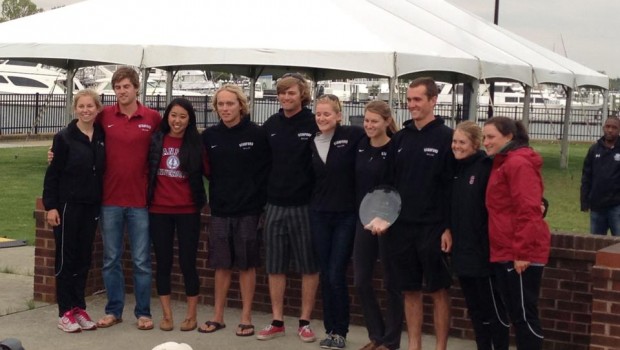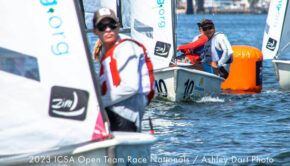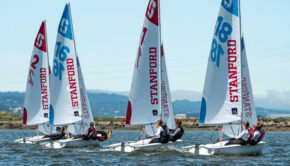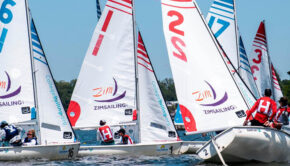COLLEGE: How Stanford has stayed strong
Published on May 22nd, 2013
The Inter-Collegiate Sailing Association (ICSA) is the governing authority for college sailing competition throughout the United States and in some parts of Canada. There are seven active conferences, but it has been the New England and Mid Atlantic regions that have long held the advantage.
With these schools offering varsity status (read: funding) and active race schedules, it is a potent formula for attracting top talent to build powerhouse teams.
There was an era when the top western sailors stayed near home for college, and an array of club-level teams in the Pacific Coast Collegiate Sailing Conference (PCCSC) could hold their own on the national stage. But that ship has long sailed, and with most of the top California sailors heading east, the competitive balance of college sailing is, er, unbalanced.
So how is it that Stanford University in Palo Alto, CA, one of only two varsity teams in the PCCSC, can be entering the Team Race Nationals (May 25-27) and the Dinghy Nationals (May 28-30) as the top ranked school in the ICSA?
Scuttlebutt posed this question to John Vandemoer, Head Coach of the Stanford team:
JV: Stanford does compete in a very weak conference right now. There is no way to deny that. So for us to stay competitive we do two things that not only keeps us competitive but keeps things fun on our team.
First we focus on improvement, not results. We believe if we can work hard together every day – on the water, in the gym, or in the classroom – the results will take care of themselves. Our focus is on developing a competitive practice. To do that we recruit actively and we get everyone to top level regattas.
We are unlike most top teams in the country that sail most of the same people every weekend at inter-conference events. We sail everyone. Every player that was available sailed at least one if not more inter-conference events on the east coast in the fall and in the spring seasons. Everyone comes on our spring break trip to the east coast and gets exposed to the top level and everyone team races, not only in practice but in major east coast inter-conference events. This gets the team fired up and brings everyone up to a high level.
Second, we share information and everyone is encouraged to be both a student and a teacher at practice. Everyone on the team has something to contribute and it is our job to pull that out.
What is your approach going into Nationals?
JV: Our focus is to simply strive to improve throughout the events and put ourselves in a place where we can battle to the top. Sailing is a sport with so many variables – worrying about winning or losing seems almost a waste of time. We focus on how we can be in a position to win by simply working together to improve. We entered last year’s post season with expectations of how we needed to do X or it was all not worth it. This year is very different; we can’t worry about the end result. We can only focus on improving and adapting throughout the event. This type of focus gives us improved confidence in any event we sail.
The Nationals are in Flying Juniors. How does that impact your team’s chances?
JV: We see this as an advantage because Stanford now trains in the same version of the FJ. Most Nationals, and most of college sailing, are sailed in the FJ, but the Pacific Coast and Northwest conferences are the only two that use the heavier Club FJ. Those boats are very different, particularly their response in down-speed maneuvers. We now sold our old fleet of CFJs and have bought 18 of the East Coast FJ, which has certainly changed our comfort level at regattas and has given us much more confidence.
****
The ICSA Spring Nationals are being hosted by University of South Florida & St. Petersburg YC
May 21-24, 2013: 46th Sperry Top-Sider ICSA Women’s National Championship
May 25-27, 2013: 54th ICSA / APS Team Race National Championship
May 28-30, 2013: 78th ICSA / Gill Dinghy National Championship









 We’ll keep your information safe.
We’ll keep your information safe.